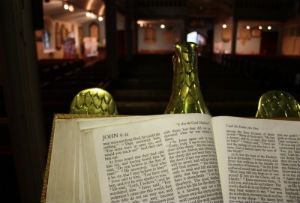‘For ten months of the year I listen to what the church says. For two months of the year I listen to God’.
 |
"Bible Reading" by Matt Banks/freedigitalphotos.net
|
We were sat in his garden enjoying the July sun and the conversation fell to holidays. Our churches did not have a summer programme. Many of the groups and organisations were having a break and that’s when he came up with how he spent July and August.
Of course he believed that God might speak through the church, but he was describing the fact that from the autumn his church would largely dictate what he did with his time and energy. He used the summer to read and study, keeping in mind the sermons and other speaking material that he would have to produce in the coming months. It was also a time to reflect, pray and pick up a word or two from the Lord.
So what about it? Are the next couple months time for ministers to wonder what they’ve been up to on Sunday mornings and what might be called of them in the future? And I wouldn’t exclude church members from a similar exercise.
I suppose it’s a sort of ‘what do you think of it so far’ exercise. Maybe summer is the time for the minister and church to talk together about – not the services - but the preaching. It shouldn’t be a popularity contest, but more a time to consider what occupies a significant amount of time in preparation and delivery.
Just what is going on when the powerpoint clicks on, the preacher clears her throat and everyone settles down for....?
Here’s an answer from Walter Brueggemann, who believes that preaching is the chance to:
summon and nurture an alternative community
with an alternative identity, vision, and vocation,
preoccupied with praise and obedience
toward the God we Christians know fully
in Jesus of Nazareth.
From an article ‘Some missing prerequisites’ for the
Journal for Preachers (1990).
There’s quite enough there for one summer’s evening and it certainly would take the conversation beyond the length of the sermon and whether or not there is a place for them in today’s culture. Brueggemann is careful in fact not to talk about the sermon as such, but rather the act of preaching.
He describes it as an odd form of communication in a world which has multiplied ways of speaking and listening beyond recognition even since 1990.
He expects it to offer a significantly different voice to the consumerist, militarised tone of what is ‘preached’ through various forms of media – public and private.
He regards it as a community shaping force. He takes preaching seriously.
I wonder whether that is still the case in a church you might know?